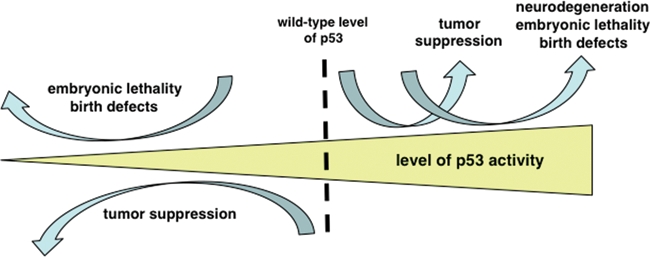Figure 1.

The level of p53 as a determinant of life and death. Elevating basal p53 function beyond its normal wild-type level can enhance tumor suppression. However, as p53 levels continue to rise, the benefits of enhanced tumor suppression become increasingly negated by the deleterious effects of the antigrowth properties of p53 in developing and homeostatic tissues. Chronic or aberrantly elevated p53 function is implicated in the neurodegeneration associated with several central nervous system pathologies, including Alzheimer and Parkinson diseases in adults and congenital birth defects and lethality in developing embryos. Conversely, loss of p53 function increases lifelong susceptibility to cancer and may abrogate a critical developmental checkpoint in the embryo.
